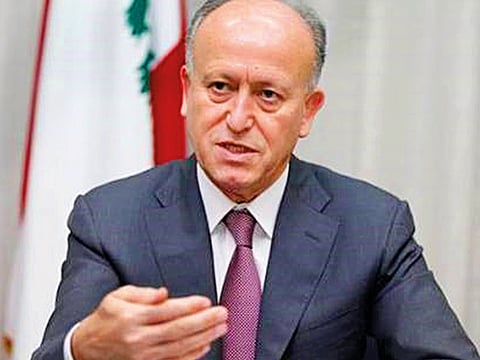Meet the Lebanese generals who want to take down Hariri
Al Sayyed despises Hariri for his anti-Syrian stances while Rifi believes he hasn’t gone far enough

Damascus: When their names were first registered for the upcoming parliamentary elections on 6 May, Ashraf Rifi and Jamil Al Sayyed raised eyebrows among Lebanon’s civil society.
The thought of two powerful ex-generals joining the Lebanese parliament was alarming, especially that the last three presidents of the republic have all been officers as well.
The two controversial men were tough, seasoned, and tied to foreign powers, with Al Sayyed being an ally of Iran and Rifi to Saudi Arabia.
Rifi, 64, hails from a Sunni family in Tripoli.
He studied the sociology of crime at the Lebanese University and underwent police training in Canada, France, and Saudi Arabia.
He was appointed director of Internal Security Forces (ISF) after the resignation of General Ali Al Hajj, shortly after the murder of ex-Prime Minister Rafik Hariri in February 2005.
Rifi became exceptionally close to current prime minister Sa’ad Hariri, the son of Rafik, and established a reputation for being an ardent opponent and outspoken critic of Hezbollah, calling them a “state within a state.”
He retired at the age of 60 in 2014 and served for two years as minister of justice, stepping down in February 2016 in objection to the rising influence of Hezbollah on Lebanese politics, especially after Saudi Arabia withdrew a $3 billion USD loan to Lebanese security, due to the Iran-backed party.
He has since parted ways with Hariri, furious with his former ally for striking a deal with Hezbollah that restored him to power in late 2016, making Hezbollah’s ally, General Michel Aoun, president.
During the last municipality elections of Tripoli, he backed a list that defeated Hariri’s candidates and had his eyes set on replacing him when Hariri temporarily stepped down from office last November.
Rifi is now campaigning on “putting an end to corruption” and hoping to bring down the Hariri cabinet, which includes two Hezbollah members.
Referring to his former friends turned enemies in Hariri’s Future Movement, he recently said: “Their battle is against me, not against the Syrian regime. We know very well that they have received a green light from Hezbollah to attack me, whereas they agree on everything with the presidency, which is Hezbollah’s ally.”
Rifi is running on an 11-member electoral list for the Tripoli-Dinniyeh-Minieh district.
“Rifi’s reputation has suffered in the past year or so,” says veteran journalist Nicholas Blanford, who has covered Lebanon for the Christian Science Monitor for years.
Speaking to Gulf News, he added: “There was a time when his pictures were going up in places like Arsal and Iqlim Al Kharroub north of Sidon, but today he seems to have gone back to being a Tripoli politician. I don’t seem him posing much of a threat to Hariri at present.”
One reason for that is that he hasn’t been able to win the full support of Saudi Arabia yet, which is the traditional patron of Lebanese Sunnis.
Rifi has tried hard, however, through his hawkish stance on Hezbollah, and through initiatives like writing to the United Nations, condemning any criticism of the war on Yemen.
Ordinary citizens admire Rifi’s courage but as a relative self-made newcomer from humble origins, he is finding it hard to break into society dominated by traditional feudal political families.
The buzz around him seems to have ended shortly after the campaigning started, as he is overshadowed, perhaps unintentionally, by more enduring and seasoned politicians.
The same goes for Jamil Al Sayyed, another hawk from the other side of the political spectrum, running for parliament in-alliance with Hezbollah.
Born into a Shiite family in the Bekka Valley in 1950, he studied at the military academy and underwent advanced training in France, Egypt, and the US, becoming head of military intelligence in the First Brigade of the Lebanese Army during the early stages of the Civil War.
In 1983-1991, he was the chief intelligence officer in the Bekka and then charged with the security of President Elias Hraoui until 1998 when Emile Lahhoud appointed him director of General Security—a post traditionally held by a Maronite and not a Shiite. He was exceptionally close to Hezbollah—an alliance that landed him in jail in 2005, where he was accused of the Hariri murder.
Al Sayyed remained in jail until 2009 and released for lack of evidence.
He subsequently launched an ostentatious comeback that was strongly Syria-backed and pro-Hezbollah.
Like Rifi he too hopes to bring down Sa’ad Hariri—although for very different reasons—but apart from that the two men are at daggers end, agreeing on practically nothing else.
“These two generals took off their military uniform and now aspire to enter parliament, which gives them two things: immunity and the chance to remain relevant after military retirement,” said prominent journalist Ghassan Hajjar, managing editor of the mass circulation Beirut daily Al Nahar.
Speaking to Gulf News, he added: “Their influence, however, won’t surpass that of any other parliamentarian, given that their experience is neither civil nor legislative. The parliament and political structure will not allow them to achieve much but will make them stand out is their different and outstanding positions (on political issues) but that won’t transform into an achievement.”
Sign up for the Daily Briefing
Get the latest news and updates straight to your inbox


